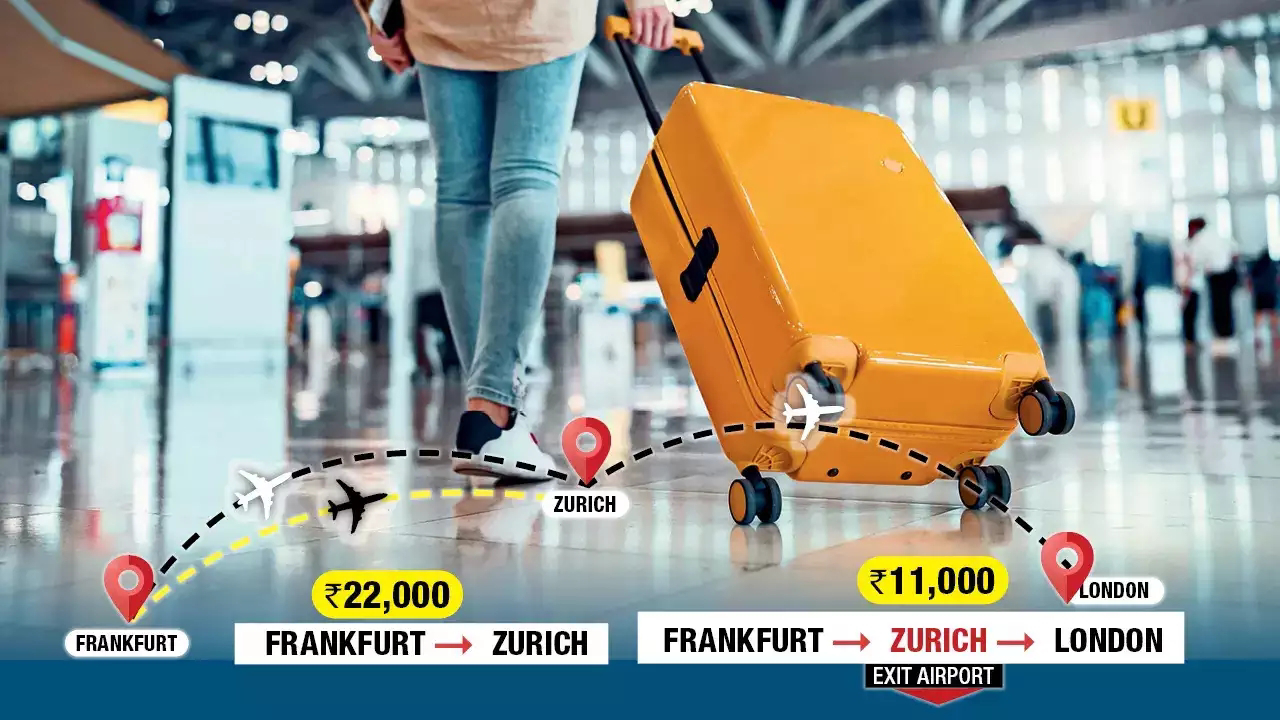In today's world, travellers are constantly seeking ways to save money on flights. One lesser-known but increasingly popular strategy is called skiplagging. This travel hack has become a topic of debate in the airline industry, with some hailing it as a smart way to save money, while others warn of its legal and ethical implications. In this article, we will dive deep into what skiplagging is, how it works, and whether it's worth the potential risks.
What is Skiplagging?
Skiplagging, also known as hidden city ticketing, is a method where a traveller books a flight with a layover but only intends to use part of the ticket—specifically, the flight to the layover city rather than the final destination. The idea behind this is simple: sometimes a flight with a layover is cheaper than a direct flight to the layover city itself.
For example, if you're looking to travel from City A to City B, you might find that booking a flight from City A to City C, with a layover in City B, is cheaper than a direct flight to City B. So, instead of continuing to City C, you simply get off the plane at the layover, City B. This is skiplagging.
Why Does Skiplagging Work?
The reason skiplagging works lies in the complex pricing strategies used by airlines. Airlines price tickets based on factors like demand, competition, and even routes between specific hubs. It’s not uncommon for flights to less popular destinations with layovers to be cheaper than direct flights to major cities, even when the layover city is the traveller’s intended destination.
For instance, let’s say a flight from New York to Chicago costs $300, but a flight from New York to Denver, with a layover in Chicago, costs only $250. A skip-lagging traveller would book the New York to Denver flight but would simply disembark in Chicago, never completing the final leg of the trip.
Is Skiplagging Legal?
Skiplagging falls into a legal grey area. It is not illegal per se, meaning there are no laws that make hidden city ticketing a criminal offence. However, most airlines explicitly prohibit this practice in their terms and conditions. By engaging in skiplagging, travellers may be violating the contract of carriage—the agreement between the airline and the passenger.
Airlines have increasingly cracked down on this practice, and while they cannot take legal action in many cases, they have imposed penalties on passengers caught skiplagging. These penalties can range from:
1. Cancellation of return or onward flights: If a traveller skips a leg of the journey, the airline may cancel the rest of the itinerary.
2. Frequent flyer account suspension: Airlines can revoke miles or even ban the passenger from future loyalty program benefits.
3. Fines: In rare cases, airlines have sought damages, claiming lost revenue.
Airlines’ Perspective
Airlines argue that skip-lagging undermines their pricing structure and leads to revenue losses. When a traveller skips a leg of the journey, the seat on the remaining portion of the flight goes empty, which is a loss for the airline. Moreover, airlines face operational inefficiencies due to inaccurate passenger counts, which could potentially affect fuel planning, staffing, and other logistical aspects.
Some airlines have even gone so far as to take legal action against websites that promote or enable skiplagging, such as Skiplagged.com, which specifically helps travellers find hidden city flights. In 2014, United Airlines and Orbitz sued Skiplagged.com, claiming it intentionally promoted a breach of contract. Although the lawsuit was dismissed, the case highlighted the seriousness with which airlines approach skiplagging.
The Risks of Skiplagging
While skip-lagging may save travellers money, it comes with several risks:
1. No Checked Baggage: If you skiplag, you can't check luggage. Any checked bags will be sent to the final destination on your ticket, not the layover city. Only passengers travelling with carry-on luggage can attempt this method.
2. Cancellation of Future Flights: If your ticket includes a return trip or multiple legs, skipping one flight may result in the airline cancelling all future legs of the journey.
3. Frequent Flyer Account Bans: Airlines can ban travellers from their frequent flyer programs, revoke miles, or prevent them from accumulating points in the future.
4. Limited Use: Skiplagging only works for one-way flights or the first leg of a round-trip ticket. If you’re planning a round-trip, you can't use skip-lagging on the return leg because your entire itinerary might be cancelled once you skip a flight.
5. Airline Retaliation: In some cases, passengers may face fines or legal threats from airlines for repeated use of skiplagging.
Is Skiplagging Worth It?
Skiplagging appeals to budget-conscious travellers looking to save money on airfare, and for some, the potential savings may be worth the risk. However, before attempting skiplagging, travellers should carefully weigh the benefits against the possible downsides, especially if they value their relationship with a particular airline or frequently check luggage.
Moreover, while it may seem like a clever trick, it is essential to remember that airlines consider it a breach of their terms and conditions, and frequent use could lead to consequences. If you are willing to take the risk, make sure to do so with full awareness of the potential penalties.
Alternatives to Skiplagging
If the risks associated with skip-lagging seem too high, there are other ways to save money on airfare without breaching airline policies:
1. Use Flight Comparison Tools: Websites like Google Flights, Skyscanner, or Kayak can help you find the cheapest available flights without needing to resort to hidden city ticketing.
2. Book Early or Late: Booking well in advance or taking advantage of last-minute deals can sometimes lead to significant savings.
3. Be Flexible with Dates: If your travel dates are flexible, you can often find cheaper flights by avoiding peak travel days.
4. Use Frequent Flyer Miles: If you travel frequently, signing up for an airline’s loyalty program can earn you points toward free flights or upgrades.
Skiplagging is a travel hack that can offer significant savings, but it’s not without its risks. While it isn't illegal, it violates most airlines' terms of service, which could lead to penalties, from ticket cancellations to being banned from loyalty programs. Before you try skiplagging, make sure you understand the risks and decide if it's a chance you're willing to take.
Ultimately, while it may seem like a loophole, airlines are growing increasingly vigilant in tracking and discouraging this practice. Whether you choose to use it or not, always consider the full implications for your travel plans.

